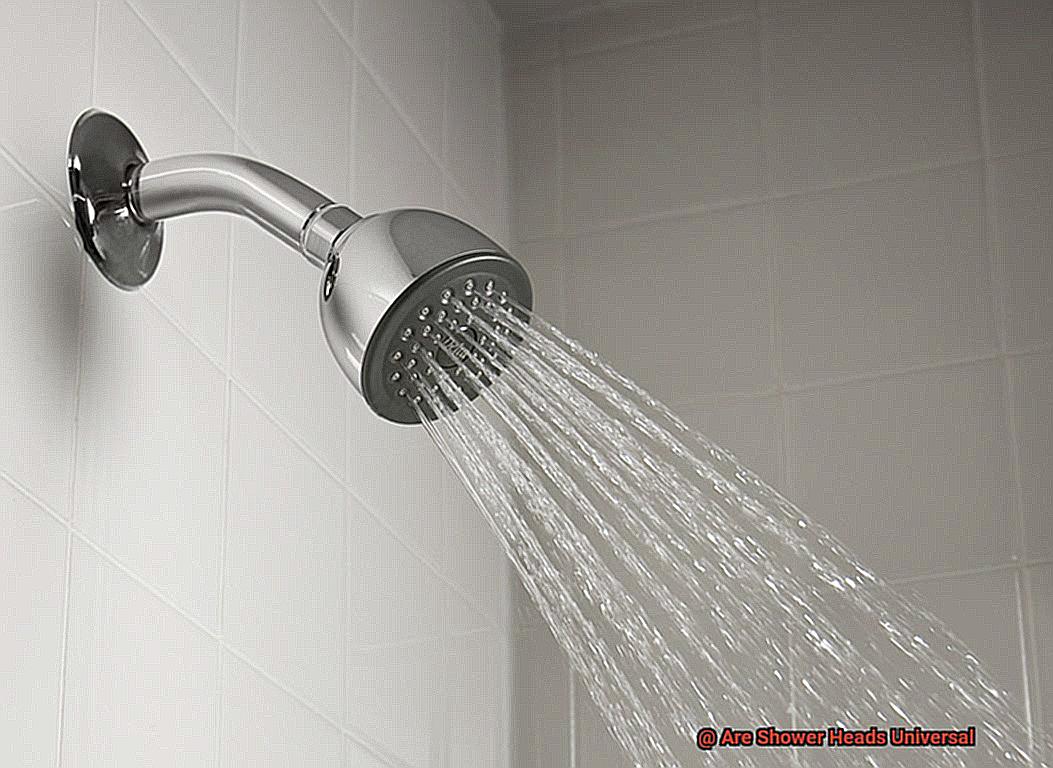Imagine stepping into your bathroom after a long day, turning on the shower and feeling the warm water wash away all your stress. It’s a feeling like no other. And when it comes to showering, having the perfect shower head can make all the difference. But are all shower heads created equal? Are they universal? Can you simply take one from one bathroom and install it in another without any issues?
The truth is, while many people believe that shower heads are universal, there are actually several factors you need to consider before making a purchase or attempting to switch them out. In this article, we’ll explore the different types of shower heads available in the market and help you identify which ones will work with your existing installation.
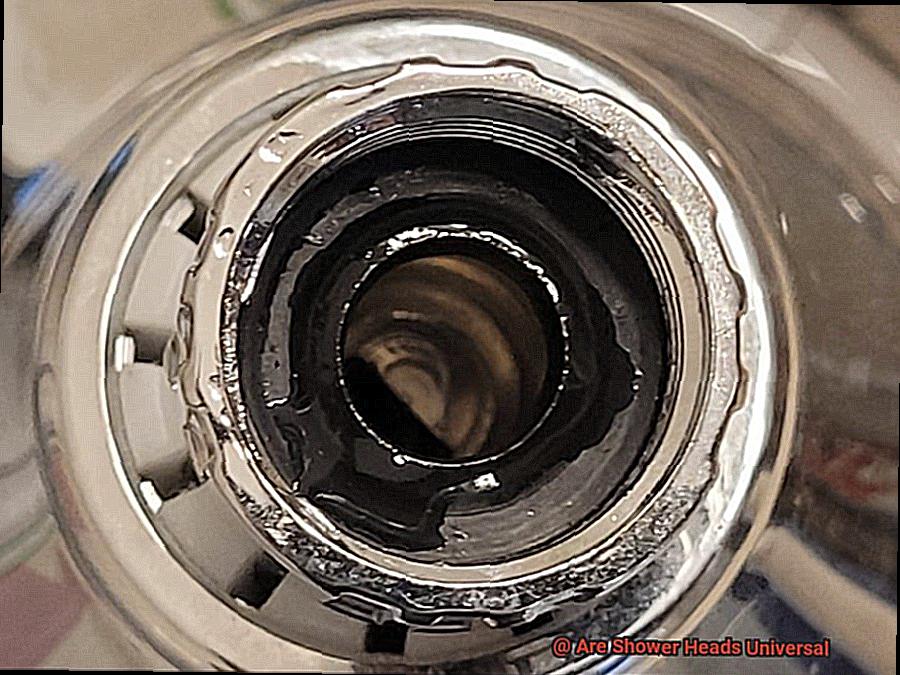
From rainfall to handheld options, there’s a wide range of shower heads to choose from. But not every type will fit onto any shower arm without issue. That’s why it’s important to know what features to look for when buying a new shower head.
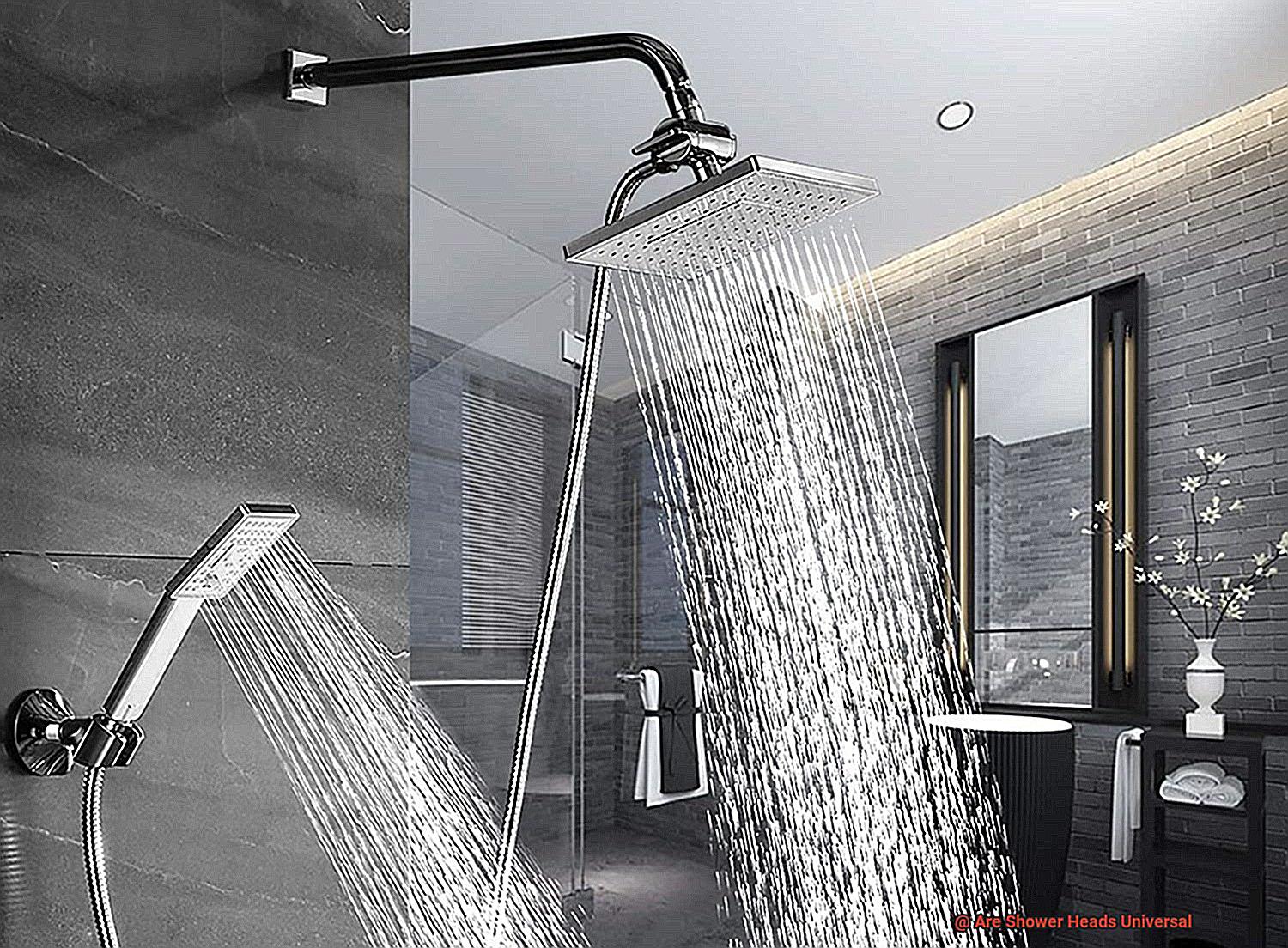
So whether you’re renovating your bathroom or just looking for an upgrade, keep reading to find out if your dream shower head is truly universal or if you’ll need to do some research before making your purchase.
Contents
What Are Shower Heads?
Shower heads – they may seem like a mundane part of your bathroom, but they play a crucial role in your daily routine. They’re the components that dispense water to help you clean yourself and come in various styles, shapes, and sizes. From basic to luxurious, there is a shower head out there to meet your needs.
There are two main types of shower heads: fixed and handheld. Fixed shower heads are attached to the wall and cannot be moved. Handheld showerheads, on the other hand, come with a hose that allows them to be moved around freely. Some showerheads come with both fixed and handheld options, providing greater flexibility in terms of how you use them.
Different types of shower heads cater to different preferences. Rainfall or rain showerheads are designed to mimic the sensation of standing in the rain, while wall-mounted showers are fixed above the bather’s head. Handheld showerheads are attached to a hose and allow for greater flexibility in terms of directing water flow. High-pressure showerheads, as the name suggests, maximize water pressure and provide an invigorating experience.
Showerheads can be made from various materials such as plastic, metal, or chrome. If you’re environmentally conscious, eco-friendly showerheads limit the amount of water used during each shower while still providing an enjoyable experience. These types of showerheads can help you save money on your water bill while also conserving water.
When choosing a new shower head, it’s essential to consider compatibility with your existing plumbing. Upgrading your shower head without considering compatibility can lead to frustration and wasted money, so make sure you do your research before making any purchase.
Are Shower Heads Universal?
The answer is no, but don’t worry; we’re here to help you navigate the factors that determine compatibility with your existing plumbing.
First and foremost, consider the type of shower head you have. Fixed, handheld, rain, or combination shower heads each have unique installation requirements that vary by manufacturer and model.
The size and shape of the shower head also matter. Manufacturers offer different sizes and shapes, making it important to ensure that your choice fits your current setup. Some models may require a specific connection or adapter that may not be compatible with your plumbing.
It is vital to keep water pressure in mind when choosing a shower head. Some require higher water pressure to function correctly. If your pressure is too low, you may need to install a booster pump or select a shower head designed for low-pressure conditions.
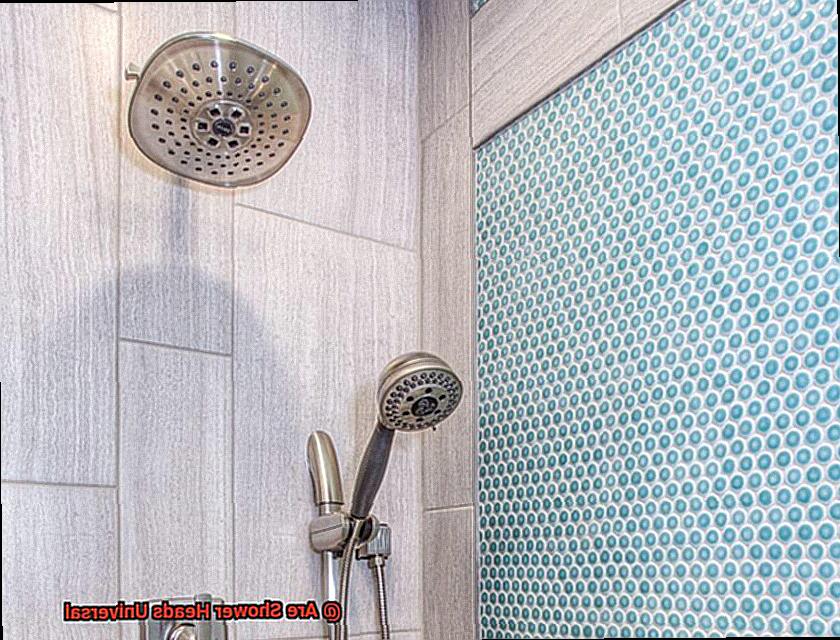
In summary, while there is no universal standard for shower heads, you can find one that works with your existing plumbing. By considering factors like type, size and shape, and water pressure requirements, you can choose a shower head that meets your needs and budget.
Factors to Consider When Determining Whether a Shower Head Is Universal
There are several factors to consider when selecting a universal showerhead.
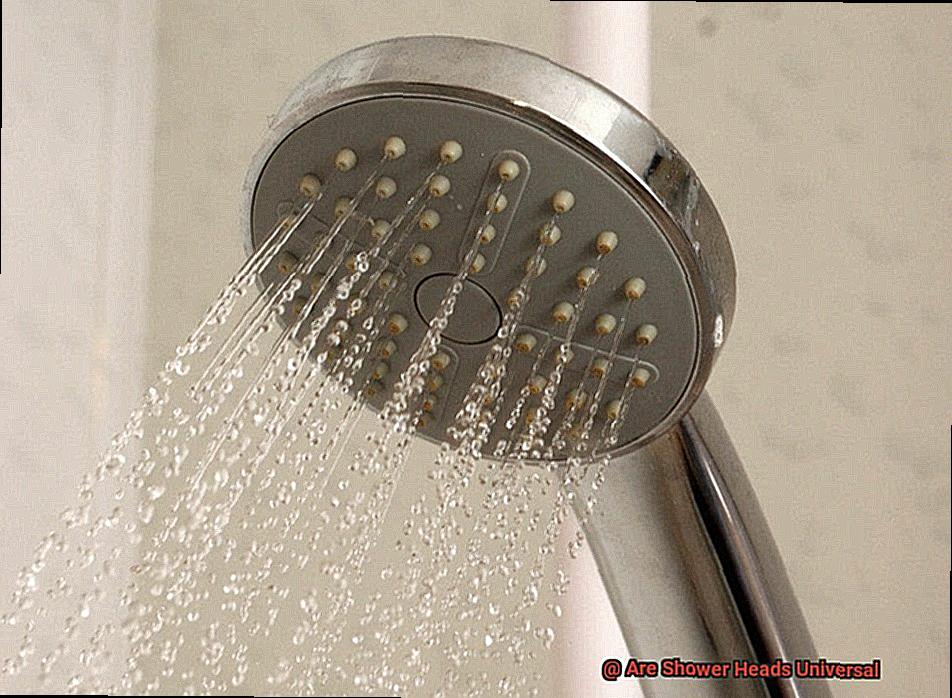
Size and Threading
When it comes to creating the perfect shower experience, don’t overlook the importance of size and threading. These factors may not be the first things you think about when selecting a shower head, but they can make or break your installation process.
Think of it like trying to fit a square peg into a round hole – if the shower head doesn’t match the size and threading of your existing plumbing fixtures, you’re in for a frustrating and time-consuming installation process. To avoid this, it’s crucial to consider the size and threading of your shower head before making a purchase.
Most residential bathrooms use the standard ½ inch shower head size, but there are other sizes available such as ⅜ inch and ¾ inch. If you have an older home or unique plumbing fixtures, double-checking the size of your existing shower arm or pipe is essential to ensure that your new shower head will fit properly.
Threading is another critical factor to consider. Think of it like matching screws and bolts – different threading patterns require specific matching parts. The two most common types of threading are NPT and BSP. NPT threading is used more commonly in the United States, while BSP threading is used more commonly in Europe and other parts of the world.
It’s essential to remember that not all shower heads will fit onto every shower arm or pipe due to differences in sizing and threading. Before making a purchase, double-check the measurements and threading type to ensure that your new shower head will fit properly onto your existing plumbing fixtures.
Type of Water Flow
When it comes to shower heads, there’s more to consider than just the design and style. The type of water flow is a crucial factor that can make all the difference in your daily routine. There are two main types of water flow: aerated and laminar, each with its own unique benefits.
Aerated water flow is like a refreshing burst of bubbles on your skin. This type of flow mixes air with water, creating a bubbly sensation that can increase water pressure while still conserving water. However, some people may find that this type of flow can leave their skin feeling dry or itchy.
On the other hand, laminar water flow is like a smooth and steady stream of silk. This type of flow doesn’t mix air with water, providing a stable and gentle stream that’s perfect for those with sensitive skin. Laminar water flow also reduces the potential for irritation and excess moisture in your bathroom.
It’s important to note that different shower heads may offer one or both options for water flow. Researching and comparing different models will help you find a shower head that meets your preferences and needs.
By understanding the type of water flow in your shower head, you’ll be able to transform your shower experience into a luxurious and personalized escape. Whether you prefer the effervescence of aerated flow or the smoothness of laminar flow, there’s an option out there for everyone.
Plumbing System Compatibility
When it comes to shower heads, compatibility with your plumbing system is key. Choosing the wrong match can lead to frustration and disappointment, much like dating someone who just doesn’t get you. So, let’s talk about Plumbing System Compatibility and how to find the perfect match for your bathroom.
First things first, identify your plumbing system. Is it copper, PVC, PEX, or galvanized steel? Each system has unique features and requirements, so be sure to choose a shower head that is compatible with your specific set up. Just like finding a partner who shares your values and interests, you want a shower head that complements your plumbing system.
Next up is water pressure. Different shower heads require different levels of water pressure to work properly. If you choose a shower head that needs more pressure than your home can provide, you’ll end up with a weak and lackluster shower experience. On the other hand, if you select a shower head that requires less pressure than what you have, you could cause damage to your pipes or leaks. It’s like trying to fit a square peg into a round hole – it just won’t work.
Lastly, don’t forget about any additional accessories or features needed for installation. Some shower heads may require specific shower arms or flanges that are compatible with your plumbing system and existing fixtures. It’s like bringing home a new pet without the necessary supplies and accommodations- it just won’t work out in the end.
By taking the time to research and identify your plumbing system and its requirements, you can ensure that you choose a shower head that works seamlessly with your home’s infrastructure. When everything fits together smoothly, the relationship (or in this case, shower experience) will be nothing short of amazing.
Adapters for Non-Universal Shower Heads
Fear not, for we have the perfect solution for you – adapters for non-universal shower heads. These nifty gadgets allow you to connect your non-standard shower head to a standard shower arm, giving you greater flexibility in choosing the perfect shower head for your bathroom.
Choosing the right adapter is crucial, as it needs to match the size and thread of your shower head. Fortunately, you can easily find adapters of various sizes and types at your local hardware store or online retailer. It’s like finding a puzzle piece that fits perfectly into your picture.
Two common types of adapters are slip-on and screw-on. Slip-on adapters work like a sleeve that slides over the existing shower arm and provides a new thread for the shower head. It’s like adding a stylish jacket to complete your outfit. On the other hand, screw-on adapters work like a direct connection that screws onto the shower arm and provides a new thread for the shower head. It’s like connecting with someone who shares your interests and values instantly.
However, not all non-universal shower heads can be adapted to fit onto a standard shower arm. Some high-pressure shower heads or those with complex spray patterns may require a specific type of connection that cannot be adapted. It’s like trying to fit a square peg into a round hole – it just won’t work.
If you’re unsure which adapter is suitable for your non-universal shower head, don’t hesitate to seek advice from a professional plumber or visit your local hardware store. They are like love gurus who can guide you in finding the perfect match.
Finding the Right Shower Head for Your Needs
If so, you’re in the right place. We have compiled some expert advice on how to find the perfect shower head for you.
First things first, it’s important to understand that shower heads are not universal. They come in various shapes, sizes, and styles, which means that not all shower heads will fit your existing setup. Therefore, compatibility issues should be taken seriously.
To begin with, measure the size and shape of your current shower arm or consult a professional plumber to determine what type of shower head will work best for you. Once you know what type of shower head you need, it’s time to consider other factors that make a shower head perfect for your needs.
One crucial factor is water pressure. If you have low water pressure, then a high-pressure shower head may be the solution to your problem. Conversely, if you have high water pressure, then a low-pressure shower head may be better suited for you.
Another important factor is spray pattern. Some people prefer a gentle rain-like shower experience while others prefer a powerful massage-like spray. It all comes down to personal preference.
Special features like massage settings or adjustable flow rates can also make a difference in finding the right shower head for your needs. These additional features can enhance your overall shower experience and provide added comfort.
fiv4Zq9v4co” >
Conclusion
In conclusion, shower heads are not necessarily universal.
While some may fit onto various types of pipes and fixtures, it’s important to check the specifications before making a purchase. Additionally, factors such as water pressure and flow rate can also affect compatibility.
By taking these steps, you can ensure that you have the right shower head for your specific needs and avoid any potential headaches down the line.

